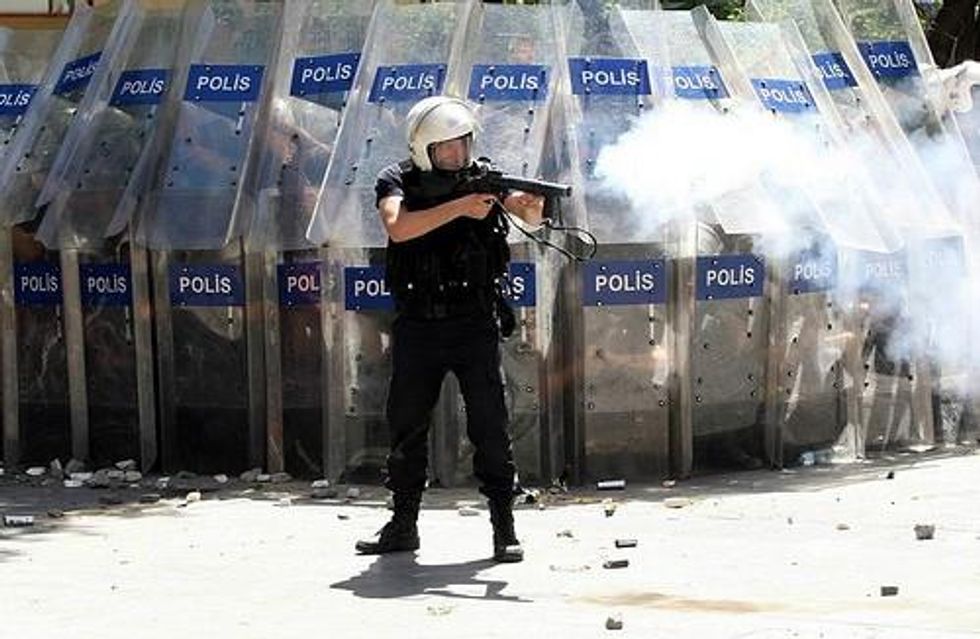New Law in Turkey Criminalizes Protests Before They Happen
'Legal basis for a police state': Drastic new regulation signals expansion of police powers despite global condemnation of crackdown on recent uprisings

Leading Turkish paper Hurriyet reported Sunday that the new regulations will allow police to monitor groups suspected of organizing public protests and arrest their members for up to 24 hours if authorities deem, based on intelligence, that they "might hold a protest."
The regulation also imposes harsher penalties on people charged with resisting police or harming public property.
The Turkish government, which has the second-most police per capita in the world, has already come under international criticism for its violent repression of country-wide mobilizations sparked by the Gezi Park protests this summer.
The new regulations suggest that the government is seeking to expand its powers in the wake of the popular pro-democracy movement that grew beyond the initial concerns over the use of public lands.
The expansion of police powers embodied in the new law has prompted an outpouring of concern.
"This application is scary and unconstitutional," declared Umit Kocasakal, president of the Istanbul Bar Association. "We know how police exceed their authority. By this regulation, we remove judges and prosecutors and are giving the state of law to the police. They have brought police to the position of chief prosecutor and the legal basis for a police state is being prepared."
To view responses to the new regulations and commentary from people in Turkey and across the world, see the following Twitter feed:
Tweets about "policestate AND turkey"
_____________________
An Urgent Message From Our Co-Founder
Dear Common Dreams reader, The U.S. is on a fast track to authoritarianism like nothing I've ever seen. Meanwhile, corporate news outlets are utterly capitulating to Trump, twisting their coverage to avoid drawing his ire while lining up to stuff cash in his pockets. That's why I believe that Common Dreams is doing the best and most consequential reporting that we've ever done. Our small but mighty team is a progressive reporting powerhouse, covering the news every day that the corporate media never will. Our mission has always been simple: To inform. To inspire. And to ignite change for the common good. Now here's the key piece that I want all our readers to understand: None of this would be possible without your financial support. That's not just some fundraising cliche. It's the absolute and literal truth. We don't accept corporate advertising and never will. We don't have a paywall because we don't think people should be blocked from critical news based on their ability to pay. Everything we do is funded by the donations of readers like you. Will you donate now to help power the nonprofit, independent reporting of Common Dreams? Thank you for being a vital member of our community. Together, we can keep independent journalism alive when it’s needed most. - Craig Brown, Co-founder |

Leading Turkish paper Hurriyet reported Sunday that the new regulations will allow police to monitor groups suspected of organizing public protests and arrest their members for up to 24 hours if authorities deem, based on intelligence, that they "might hold a protest."
The regulation also imposes harsher penalties on people charged with resisting police or harming public property.
The Turkish government, which has the second-most police per capita in the world, has already come under international criticism for its violent repression of country-wide mobilizations sparked by the Gezi Park protests this summer.
The new regulations suggest that the government is seeking to expand its powers in the wake of the popular pro-democracy movement that grew beyond the initial concerns over the use of public lands.
The expansion of police powers embodied in the new law has prompted an outpouring of concern.
"This application is scary and unconstitutional," declared Umit Kocasakal, president of the Istanbul Bar Association. "We know how police exceed their authority. By this regulation, we remove judges and prosecutors and are giving the state of law to the police. They have brought police to the position of chief prosecutor and the legal basis for a police state is being prepared."
To view responses to the new regulations and commentary from people in Turkey and across the world, see the following Twitter feed:
Tweets about "policestate AND turkey"
_____________________

Leading Turkish paper Hurriyet reported Sunday that the new regulations will allow police to monitor groups suspected of organizing public protests and arrest their members for up to 24 hours if authorities deem, based on intelligence, that they "might hold a protest."
The regulation also imposes harsher penalties on people charged with resisting police or harming public property.
The Turkish government, which has the second-most police per capita in the world, has already come under international criticism for its violent repression of country-wide mobilizations sparked by the Gezi Park protests this summer.
The new regulations suggest that the government is seeking to expand its powers in the wake of the popular pro-democracy movement that grew beyond the initial concerns over the use of public lands.
The expansion of police powers embodied in the new law has prompted an outpouring of concern.
"This application is scary and unconstitutional," declared Umit Kocasakal, president of the Istanbul Bar Association. "We know how police exceed their authority. By this regulation, we remove judges and prosecutors and are giving the state of law to the police. They have brought police to the position of chief prosecutor and the legal basis for a police state is being prepared."
To view responses to the new regulations and commentary from people in Turkey and across the world, see the following Twitter feed:
Tweets about "policestate AND turkey"
_____________________

